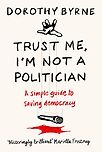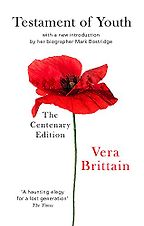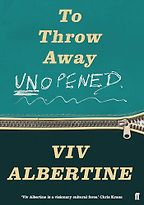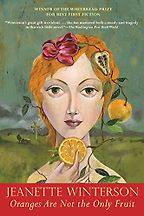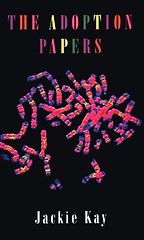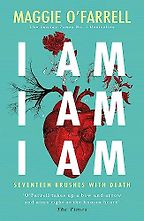You’ve chosen memoirs, I am wondering if there are any common themes across the books that you’ve chosen, apart from being by women?
I think the searing truthfulness of them is what comes across, and in everyday life. People often don’t really tell you the truth about things; they tell you what’s socially acceptable or what you want to hear. These books are sometimes really shocking in their truthfulness and the one that particularly stands out for me is the Viv Albertine, where she’s just so honest that when you’re reading it you’re embarrassed — did she really just tell me that she hit her sister while her mother was lying dying? Most people just wouldn’t admit to that. The fact that she talks about having diarrhoea. I mean women just never talk about things like that. I was really struck by her honesty particularly, but also the honesty of all of them.
In The Adoption Papers, it’s the fact that it was so socially embarrassing at the time to have adopted a baby and she has her adoptive mother speaking honestly about the terrible humiliation of not being able to have a child. She puts into her adoptive mother’s mouth things like, ‘I want the pain, the tearing, searing pain’ of childbirth. She doesn’t flinch from telling you about how she herself suffered being a black child, being brought up in Glasgow. She also speaks very honestly on her ambivalence about meeting her birth mother.
Overall, the books are saying to me that it’s incredibly important when deciding how you’re going to live as a woman to be really honest, and especially in the era that I was brought up in. I was born in 1952 and women didn’t speak honestly. Problems were never talked about. People getting pregnant — a girl would disappear from school. This did happen at my school. A girl disappeared because she wasn’t well and then her mother had a baby. We all knew what had really happened but we never spoke about it. Nobody talked about sex or the menopause. You just didn’t speak about things. All these women speak in such an open and honest way. Reading about them makes you think, ‘The only way that I can be happy and successful in my life is to be really, absolutely, utterly honest with myself.’
In Testament of Youth, I think one of the things that is interesting is that she’s aware that she is a bit of a prig. She used the diary that she kept at the time. She could have removed the bits where she comes across as a pompous snob, but she didn’t. She left it in, and when she talks about people in Buxton, other middle-class people, she refers to them as philistines. She really doesn’t come across as a nice person. I feel with all of them, they left in the bad bits. They didn’t try to just make themselves look good.
Maybe we can start with Testament of Youth by Vera Brittain then. I was reading that Brittain was originally going to write it as a novel, but then decided against it and wrote it as a memoir, which really speaks to this ‘searing truthfulness’ you were talking about.
Vera Brittain went on to write 30 novels and wasn’t regarded as a good novelist. I’ve never bothered to read her novels because I’ve always read they weren’t very good. I have read all three of her memoirs and this one is by far the best. She gave validity to what it was like to be a woman in the First World War. That was a very important thing that she did at the time — because this book came out in 1933. Poets and others had written about what it was like to be a man in the trenches and I think there was a feeling, ‘Well, women weren’t in the trenches, so how dare women talk about what it was like?’ Nothing could rival the pain that men suffered. But what she showed is that women suffered their own pain, which was a different sort of pain. What she really puts across is the agony of just waiting, waiting, waiting, and the incredible sense of helplessness that women had. They might be waiting for years and then at the end of four years — which is what happened with her brother — he died. So she had all that agony of worrying all the way through, and then in the end he died. There’s that sense of hopelessness that they are not the ones who have the power: they don’t make the decisions.
“So much of our lives were lies”
She’s describing the First World War, but a lot of this is true for many women in my lifetime. For lots of women, their husbands went out to work and they didn’t even know what time their husbands were going to come home. Their husbands might come home at 18:00, or they might come home at 23:00, after being in the pub. The woman just had to sit there all day, and then the man would decide if they were going to move to a completely different city because he’d got a job. So I think the helplessness and powerlessness, and the life of waiting, has always been integral to the lives of women. I think she describes that very well.
I find it really interesting that in 1910 hardly anybody around her had these views, but she decided for herself that she was a feminist; she wasn’t sure she would want to marry, but if she did, they would be equal and she would always work. And I think the story of her struggle to be educated is really important. It meant something to me, even in my own life. I remember when I said I wanted to be a barrister the careers teacher said, ‘Girls can’t be barristers’ and I went ‘Why not?’ And she said, ‘No, no, you have to become a teacher.’ I said, ‘Why do I have to become a teacher? I don’t want to be a teacher.’ And so I really admired that Vera Brittain fought, and said ‘I am absolutely determined, I’m going to go to university.’ I think it’s very interesting that the book was rediscovered, I believe it was in 1978. That is when I read it, and it had so much to tell me. The lives of the women who went before us have a lot to tell us now.
Perhaps from there we can move on to To Throw Away Unopened by punk legend Viv Albertine. She is also sort of fighting against this helplessness.
Yes, she says, ‘Mum programmed me to fight, not to be walked over, never to give in.’ She says that we lived our mother’s unlived lives. My mother was a civil servant, but as soon as you got married, if you were a civil servant or a teacher, you had to give up work. That was the law. So she gave up work and then she had four children and she was definitely resentful and frustrated and bored. I have three sisters and I think we all felt, and lots of women of my generation say too, that they are aware that their mother was jealous of them.
I think what was interesting about Viv’s mother is that it wasn’t so much that she was jealous of her, it was that she kept saying to her, ‘You’ve got to get out there and do it, do what you want, take risks.’ That was really very unusual for a woman in that era because my mother was all, ‘Be very careful’, ‘Be very careful what you wear.’ When my mother discovered I was on the Pill, she actually called me a prostitute. People were terrified that you’d get pregnant, and then in 1969, the year I went to university, was the first year that women, single women, could get the Pill. So I went on the Pill. And she searched all my things when I was out one day and found the Pill, and condemned me for being on it.
So I really admired the way that Viv’s mother pushed her, and the fact that Viv became the most amazing woman, the absolute punk icon she was, the brain behind The Slits. The whole look that is such a common look now, they invented. Viv’s got a fantastic dress which she made out of a string, and then she hung black condoms on the bottom. Viv would go out dressed with her very heavy black makeup, very dark lipstick, wearing these absolutely amazing outfits. She was really one of the most daring women of our generation. And you can see that that came from her mother. In Testament of Youth too, Brittain is just refusing to conform. Viv is refusing, just absolutely refusing to conform. I could never have been as daring as she is. We’re about the same age, and we’re very good friends. I say to her, ‘In this era that I was wearing Laura Ashley dresses and pink lipstick, and nice little earrings, you were just such an amazing person.’ She’s still so daring.
And she talks so openly about cancer, which people didn’t do. She talked about her cancer and talked about the horrific effects of the radiation on her body. Because what they did in the past, if a woman had advanced cervical cancer, is that they irradiated the whole pelvic area, to ensure it didn’t come back. The problem is your gastric system just doesn’t work properly afterwards. And no one, I mean no one, talks about things like that. Nobody would. I don’t know anybody else who would admit to having a physical fight with a member of their family over a deathbed.
The role of the mother is really interesting. I think you sort of have the opposite to that kind of mother in your next recommendation, Oranges are Not the Only Fruit by British author Jeanette Winterson.
That’s a very good point. In Oranges are Not the Only Fruit her mother is a monster, and yet actually her mother had a really interesting life; she’d obviously been a very attractive young woman, she’d lived in France, she’d had a French boyfriend, she’d had different boyfriends. I mean, that was extraordinary. And then she found God.
This is the novelised version of her life that she wrote when she was much younger. Then she wrote the real version as a normal memoir years later, and called it, Why Be Happy When You Could Be Normal? That was absolutely the attitude that I was brought up with; the most important thing was not that you should be happy, it’s that you should fit in, and not bring about a scandal of any sort. I can remember when my eldest sister wanted to go on holiday with her boyfriend and I don’t think they were even having sex but my mother brought the priest to the house. The priest quoted St Paul about avoiding temptation to try to persuade my sister not to go on holiday with her boyfriend. When I had a child by artificial insemination my mother was devastated and literally said to me, ‘What will the neighbours say?’ And I said to her, ‘Funnily enough, when I decided I wanted to have a baby I never thought about the neighbours, that never came into my head.’ But after I did have the baby the neighbours thought it was very exciting, and one of them said if this had been available when she was younger, she would never have bothered getting married.
The fact that Jeanette Winterson’s mother threw her out of the house because she was a lesbian, and said terrible things to her like, ‘I adopted the wrong baby, I adopted a bad baby’ – is just a really shockingly cruel way of behaving. But Jeanette Winterson overcame it. Maybe she got, from her mother, some of her strength. Her mother was clearly a very strong person, so she’s got this ambivalence about her.
You’re right, I hadn’t thought about it, but in several of these memoirs a key thing in them is women’s relationship with their mothers. What makes their characters successful is successfully overcoming how their mothers want them to behave. But also they got something from their mothers. Certainly in the case of Viv, Jeanette Winterson and Jackie Kay, they all had very strong mothers. So you see the importance of having a strong mother, even if part of the strength they give you is that you have to fight them to escape them.
Maybe we can talk about The Adoption Papers by the Scottish poet and novelist Jackie Kay next.
I think The Adoption Papers is written with great affection. I think one of the things about Jackie Kay is her huge warmth and the depth of her understanding. I think it’s really interesting that she’s able to see the perspective of three different women all at once, so she intercuts the perspective of each, whereas in the other books, it’s more the woman seeing it from her own point of view. Jackie Kay’s got this huge generosity of spirit so she can see it from three different points of view. It’s heartbreaking how honestly she has the two mothers speaking. What an ability that is — to see into the mind of your mother with such sympathy in the way that she does.
I had never thought of the thing that she writes about her adopted mother, saying, ‘telling the world your secret failure, bringing up an alien child’. For Jackie to be able to see and accept the agony that her mother felt about not being able to have her own baby before she decided to adopt – that, I think, is a really huge ability. The description of her birth mother was terrible; having to live through the scandal after she’s given her baby away, digging a hole and burying her baby’s clothes. That was a heartbreaking image. And then that line she has, ‘now my secret is the hush of heavy curtains drawn’.
You can just picture that in Scotland of the time, which I can remember, you just don’t talk about it. Of course in my era children who were adopted were not told they were adopted. One of my friends, she was annoying the next-door neighbour when she was 11, and the next-door neighbour was so annoyed with her that she told her she was adopted, to punish her. And that’s how she discovered she was adopted. You can imagine, that really messed her up. She went home and she said to her mother, ‘You never told me I was adopted.’ So much of our lives were lies. I think that’s in several of the books, that people are living lies, and these women are all saying you have to be truthful.
Shall we move on to your final pick, I Am, I Am, I Am by the novelist Maggie O’Farrell?
Yes, Maggie O’Farrell, our alumna! This is a brilliantly constructed book because you’re reading it and thinking, ‘Can you just stop taking so many risks? 17 brushes with death and you think, well, you keep jumping into the sea, walking on your own, hitchhiking in dangerous areas, why do you keep taking all these risks?’ And then, at the end, she reveals that she nearly died as a child and overheard a nurse say to another child, ‘Hush, there’s a little girl dying in there.’ Gosh, how would that affect you in your life? But the fact that rather than it making her scared in her life, it made her seize life. Rather than thinking, ‘I’m really unlucky because I got encephalitis when I was a child, I nearly died and have been left with a disability,’ she says she is a lucky person: “I have been showered with shamrocks, my pockets filled with rabbits’ feet, found the crock of gold at the end of every rainbow. I could not have asked for more from life.” I admire all these women because they didn’t let adversity destroy them. They use their adversity to turn themselves into women who seize control of their own lives, do what they want and achieve amazing things.
Five Books interviews are expensive to produce. If you're enjoying this interview, please support us by donating a small amount.
Maggie O’Farrell also describes how terrible miscarriage is. People talk about that more now, but even a few years ago people did not talk about miscarriage and stillbirth. I made a film seven years ago about stillbirth, which was one of the first major documentaries in the United Kingdom about stillbirth. And the reason that I commissioned it was that my best friend from school had a stillborn baby, and afterwards they took the baby away and she was expected to move on. People didn’t really talk about it. And actually when I was at Channel 4 we introduced a baby loss policy and a key part of the policy was that we educated the staff about what to do when somebody loses a baby. So when they come back to work, you don’t ignore what happened. You say, ‘I’m very sorry that you lost your baby. What was her name? And tell me, what was she like?’ And I just can’t describe how just within a few years what an enormous change that was. I can’t remember when Maggie O’Farrell wrote this book, but even at the time she wrote it, which was only a few years ago, women didn’t speak about having miscarriages or stillbirths. There was this sort of feeling that, well, that just happens, it’s natural, move on.
Of course people don’t move on. Maggie O’Farrell describes how she can say what age every one of her miscarried babies would be now. That one little thing tells you so much about how false the idea is that you just get over it. That’s because the narrative about miscarriages was created by men. And doctors, who were traditionally men, say to women, ‘Don’t worry, miscarriages are normal, you will have another baby, move on and forget it.’ And of course I was brought up a Catholic, and we were taught that a foetus is a human being from the moment of conception. But if a woman had a miscarriage or gave birth to a full-term stillborn baby, the Roman Catholic Church would not baptise that stillborn baby, and they could not be buried properly. So hang on a minute here, Roman Catholic Church, the baby’s supposed to be a baby from the moment of conception, but if they’re born full term, stillborn, you won’t baptise them? Riddle me that one. That was an act of the most extraordinary cruelty to Catholic women. These women lost their babies and then they believed their babies were hanging in limbo till the end of time, and then nobody ever talked about it. So I really admire Maggie O’Farrell, particularly for talking about miscarriage.
Five Books aims to keep its book recommendations and interviews up to date. If you are the interviewee and would like to update your choice of books (or even just what you say about them) please email us at [email protected]

